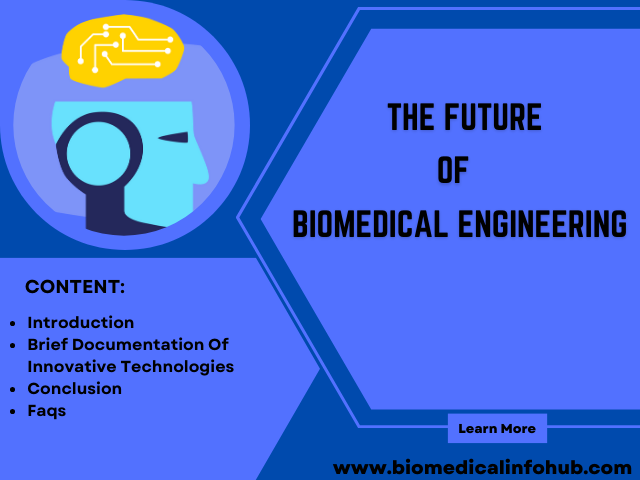Biomedical Engineering: Innovations Shaping The Future Of Healthcare
Introduction:
Biomedical engineering has already transformed healthcare in the past few decades and that's just a taste of what to expect. With tech advancements, an aging population, and sky-high healthcare demands, there are numerous exciting potential developments coming soon.
In this article, we'll explore some possible future innovations that could shape the future of healthcare.
3D Printed Organs: The Future of Transplantation
Biomedical engineers are pushing the boundaries of what's possible in healthcare, and their latest research will truly revolutionize transplantation: creating organs from 3D printing. Instead of relying on donor organs with a risk of rejection, this cutting-edge technology could make organ transplantation simpler than ever. Primarily focusing on liver and heart tissue for now, while it's still early days in development it may only be a mere matter of time before 3D printed organs become commonplace and it showcases tremendous potential for the future of healthcare.
Personalized Medicine: Tailoring Treatments to Your Genetic Makeup
By advancing through personalized medicine, scientists are making steps towards a future of more accurate and effective treatments for an individual's specific genetic makeup. Research is focusing on developing technologies that can sequence your genome quickly and economically, which could lead to more personalized treatments for a wide range of diseases paving the way for better tailored medical care, potentially reducing side effects while maximizing results.
Wearable Technology: Revolutionizing Healthcare Monitoring
Wearable technology is revolutionizing the healthcare industry. Smartwatches and fitness trackers can measure your vitals like heart rate, blood pressure, and oxygen levels in real-time to identify early warning signs of disease before they result in hospitalizations. For example, a smartwatch can track a patient's heart rate and notify them if it rises abnormally, signaling a potential heart condition. They are also used to monitor and manage chronic conditions such as diabetes by giving personalized advice tailored to each patient’s needs.
Telemedicine: Providing Convenient Access to Remote Healthcare
As we keep advancing further into a tech-driven world, telemedicine promises a great deal for the future of healthcare, providing convenient access to remote services and potentially cutting costs. This is especially beneficial for rural or underserved communities that may lack comprehensive care options in their area, telehealth will give them an effective alternative. Specialized medical support such as mental health counseling can also be made available through this technology, widening its reach even further. In addition, telemedicine is expanding and saving lives, particularly with COVID-19 persisting. As technology evolves, it's expected that these valuable resources won't just benefit specific locations but patients globally.
Medical Imaging: Precision Diagnosis
Medical imaging is set to revolutionize healthcare in the future. With technologies such as high-resolution MRI and PET-CT scans already on the scene, doctors can detect diseases way before they start to manifest - an incredible breakthrough. Moreover, medical imaging could become even more precise which would allow physicians to explore down deep at a molecular level for diagnosis purposes.
AI and Machine Learning: Customized Treatments and Real-Time Monitoring
Artificial intelligence and machine learning are revolutionizing biomedical engineering. By analyzing vast quantities of data, AI algorithms can uncover trends that were previously undetectable. That means we're now able to create personalized treatments for patients based on their individual medical history - no one-size-fits-all approach anymore. Not only that with real-time patient monitoring from AI-powered devices, a doctor or nurse can be alerted of any potential health problems early on to prevent further complications later down the line. With technology advancing every day, soon enough these incredible tools will be key in unlocking breakthrough medicine and cutting-edge healthcare equipment.


Post a Comment
Please Dont Spam. Thank You